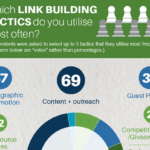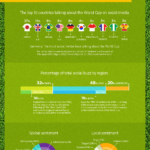The Real Effect Link and Content Velocity Have on Your Website
Just like the nuns who ran the Catholic school I attended, Google remembers everything. By the 6th grade, I was a model student; I earned good grades, played sports, and was in several clubs. But do you think those accomplishments erased my 3rd grade shenanigans from their memories? Nope, those crafty nuns don’t forget… anything. And when it comes to your company’s site, neither does Google.
Unbeknownst to many, even some SEO “pros” who shall go unnamed, past activity on your site is remembered by Google, and what’s more, good ol’ G will call on these “memories” when determining your search engine result positions (SERPs).
That said, before you start analyzing every link you’ve ever built or word you’ve ever published, let’s discuss what Google will remember:
Haven’t heard of link velocity? It’s ok, not many of us have. Link velocity refers to the rate at which your site adds new in-bound links.
Easy now, we’re not saying that high velocity is boss here. On the contrary, exponential consistency is king. Maintaining a natural pace in your link building efforts is what Google rewards.
 Inbound linking must appear natural, and to appear natural, growth must be exponential. We know that popularity increases exponentially. If a site has 10 new inbound links the first day, it makes sense that they have 100 on the second day, 1000 on the third day and so on. If, however, a site goes from 10 links to 50,000 overnight, Google is most definitely going to raise an eyebrow (or two).
Inbound linking must appear natural, and to appear natural, growth must be exponential. We know that popularity increases exponentially. If a site has 10 new inbound links the first day, it makes sense that they have 100 on the second day, 1000 on the third day and so on. If, however, a site goes from 10 links to 50,000 overnight, Google is most definitely going to raise an eyebrow (or two).
Like my adored catholic school teachers of yore, Google is not opposed to corporeal punishment. When they notice this type of unnatural growth, they impose a “Google Slap,” which lowers your SERP in increments of -30, -60, or -90 places.
In the most extreme cases, Google has been known to remove websites from the search results entirely. This isn’t as rare as you might think. According to Matt Cutts, Google receives about 5,000 reconsideration requests per day. Yikes!
The implication here is that new inbound links should be added at a natural rate that does not raise any Google red flags.
Content Velocity
Content, like links should be added at a steady pace, growing exponentially over time. It makes sense that your company added 3 pages to your site yesterday, but it seems pretty unnatural that 300 pages were added overnight. Conversely, removing massive amounts of content can result in a “slap” as well.
What’s more, Google places a high value on an attribute called “site weight” or “site depth.” Simply said, the more quality content you’ve got for your audience to consume, the better.
* Caution – Sites that binge on content by using content spinners like Article Builder or The Best Spinner, which automatically generate articles on given topics, will get slapped! A content spinner may sound like a magic bullet solution, but they typically do more harm than good. The content these programs create is unintelligible at best and easily detected as “thin content”.
By following a few simple guidelines, you can be sure everything you do will push you one step closer to SERP royalty.
Tips and Tricks:
1. Keep It Natural.
Make sure your link and content building is natural. Ultimately, Google operates as a democracy where users access high quality sites that build authentic popularity through highly related link building and quality content.
Google’s punitive measures have been put in place to ensure we don’t have to wade through hundreds of spammy sites to find what we really want. They do the dirty work for us. Use authentic links and content to show Google that your site is legit and relevant.
 2. Google Discriminates…in a Good Way
2. Google Discriminates…in a Good Way
Not all content and links are considered equal. More value is placed on links that originate from reputable and related sites. For example, my former teacher (the nun) runs a blog dedicated to St. Anthony, that has 30 readers. If she links to my site, that doesn’t get me much traction. Her site has nothing to do with mine, and anyway, nobody reads it. On the other hand, if you talk about the Insurance industry for example, and decide to write about pricing, etc. of products related to the topic, then Pinnacle Life Insurance quotes for example would make a lot more sense. Get the picture?
Similarly, bad content won’t get you ranked. Set your content apart by being original, insightful, entertaining and useful. Be sure to give actionable steps that readers can move on right away. Use a writing style that is engaging, entertaining, and (our fav) controversial. Google knows the difference between man-made content and the drivel spun out by content spinners.
3. Shout it From the Rooftops
 Imagine Google as a big mother spider sending her millions of babies on reconnaissance missions to the far-reaching corners of the web. Their job is to bring back intel on the millions of sites they crawl. Mama Spider sorts through this information and rates it.
Imagine Google as a big mother spider sending her millions of babies on reconnaissance missions to the far-reaching corners of the web. Their job is to bring back intel on the millions of sites they crawl. Mama Spider sorts through this information and rates it.
2.5 quintillion bytes of data are uploaded to the web every day. This fact alone makes it increasingly hard for Google’s spiders to reach every corner of the web. Just because you’ve added new links or content won’t mean Google knows about it. To get your additions seen, you have to get them indexed. There are many ways to do this: social networking, social bookmarking, and creating links to your links are just a few.
Links are the spiders’ highway. In order for them to find you, you have to build on-ramps and signs that help them travel to your site. No one sees you back there in your log cabin down an unmarked dirt road, no matter what kind of great (or sketchy) stuff you’re doing down there.
You can depend on the fact that they’re always watching and tracking your site’s activity and will use that activity to determine your SERPs. Add authentic, quality, natural content and links on a consistent basis, Google will give you a gold star, and you get to sit back and watch your SERP rise and your conversion rates soar.










It is true that consistency in the content creation or link building in important, however it is important here not to over worry either. If you create 100 pages of content in one day by scraping and spinning it there is a good chance of getting penalized. It it is a 100 pages of genuine content in one day posted on a blog and then 6 months no new posts, there should be no penalty here although it is definitely not the best way to go. The same with links. If you get 1000 links from submitting your site to general directories a penalty is almost a guarantee in this case. If you get the same thousand links because you write something controversial and people linking to you, it will give you a major boost in search results.
Asher, you’re absolutely right. The number of new links or pages isn’t as important as the manner in which they came about. I won’t comment about food, but in the case of new links/content, organic is always best. Thanks for your comment!
This immediately brings to mind the subject of outsourcing especially when it concerns to fiverr gigs. I see nothing wrong with using one of the quality SEO gigs as long as that gig delivers those links exponentially as you mentioned in this post.
Btw, that tip on using Craigs list forums was awesome 😉
Hey Caleb, thanks for your comment! I’ve got no issue with sites like Fiverr, as long as they’re doing whitehat link-building that won’t get you G-slapped.
Glad you liked the Craigslist tip, we find it really helpful too 🙂